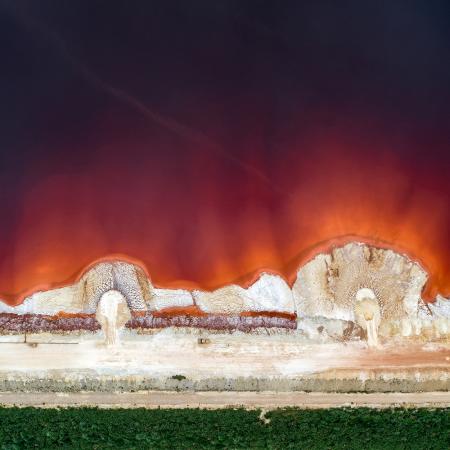"The Situation" II - Algiers
...Forced into confinement, the writer loses the ability to describe the world...
Mohamed Magani is the author of 15 novels, written in French as well as in English. Widely awarded, his fictional and non-fiction work has been translated into many European and Asian languages. He has held a writing residency with the International Parliament of Writers in Berlin, and was for six years a member of PEN’s executive committee. Presently he lives in Algiers, teaching research methods at the university level and focusing his writing on environmental issues.
“It was a spring without voices, in the mornings, which had once throbbed with the dawn chorus of robins, catbirds, doves, jays, and wrens, and scores of other bird voices, there was now no sound; only silence lay over the fields and woods and marshes.” So writes Rachel Carson in her 1962 book Silent Spring.
In Carson’s nineteen-sixties spring, the effects of man-made pesticides, environmental pollutants, and chemicals on the natural world are poignantly revealed; in the spring of 2020, at the beginning the twenty-twenties, the devastating assault of the coronavirus pandemic on humanity seems to suggest that nature, by showing its dark side, is somehow getting even. Unleashed dark forces from wild regions, or perhaps tiny beasts conceived in laboratories, have all of a sudden instilled in all humans the kind of universal fear that spares no one, given them a lesson of humility lost in the age of a global market of greed and the will to dominate at all costs.
In our lockdown, because of a virus, we are banned from going out, banned from nature. Spring is here, but out of reach, the natural course of the seasons brutally interrupted. At the edge of the dream, nature detaches itself, distances itself from humans, moves away towards the nebula of things inaccessible. For the first time I feel as if I’m writing about a vanishing world even while reading and writing take over to maintain it alive and full of life, and I seem to settle in for the long term. We while away the time with books that create other worlds for us. The coexistence of literature with the lockdown tends toward harmonization, freeing us from worries and easing somewhat human relationships. Fundamentally a solitary activity, more so even than reading, writing reinforces the lockdown. Driven away from the world and from nature, exiled from the social, the writer struggles to blacken up the pages. If loneliness is the condition of literary creation, intrusive socialness is its driving force.
Cancelled in literary activity is a back-and-forth movement of life between withdrawing into oneself and the imperative of immersion in external realities. I once wrote about the four possibilities open to the writer (of fiction) : inside/outside; outside/inside; outside/outside; inside/inside. Without a shadow of a doubt, the option that wins in the current coronavirus crisis is inside/inside. Forced into confinement, the writer loses the ability to describe the world. No matter that the power of the imagination enables him to do so, he will taste the bitterness of time wasted, for what he is lacking handicaps him, throws him into insignificance, shows the cost of running out of the spirit of solidarity, compassion, commitment in the world. He learns to put into perspective the superiority of his ego over his social being, over the environment, the natural world. Driven from the world, distant from nature, he questions his consciousness.
As my novel-in-progress was nearing completion, the outbreak of the pandemic brought the writing of the last chapter to a halt, and threw into question all that had been planned—the last thoughts and gestures of the characters, their idiosyncrasies, their uncertainties. A natural drive, so to speak, lead me towards less singularness, less internal turmoil of the characters, less of their negative and unsocial behavior, less “social distancing.” And I turned to the obvious antithesis derived from the recent history of my country, the hirak, a mass movement without parallel, aiming to profoundly alter the fabric of the social and political system. Antidote to the lockdown ahead of the hour, my novel’s final chapter encapsulates the causes of an emancipatory impulse, the shared conviction of the primacy of an all-human, collective response over individual posturing, in a period of isolation resulting from a crisis shattering our being on earth and the foundations of life.
I rushed to write that radically modified chapter with enthusiasm, hoping to seed the premises of a deconfinement that would open our eyes to the frailty of life and the consequences of our actions and behavior. Inasmuch as the lethal coronavirus has caused an upheaval in the world, writing in these circumstances has paved the way for a story ending akin to an in-depth reassessment of the function of fiction; the last chapter transfigured the novel.
Spring 2020
Vol 10 No 3
"The Situation" - II
- Editorial
- Alice Yousef (Jerusalem)
- Minae Mizumura (Tokyo)
- Chandrahas Choudhury (New Delhi)
- Peter Kimani (Nairobi)
- Jacqueline Goldberg (Caracas)
- Andrea Hirata (Sumatra)
- Mabrouck Rachedi (Paris)
- Kavery Nambisan (Kodava)
- Ameena Hussein (Colombo)
- Helon Habila (Fairfax, VA)
- Amira Gehanne Khalfallah (Istanbul/Algiers)
- Marjan Strojan (Ljubljana)
- Med Magani (Algiers)
- Beaudelaine Pierre (Minneapolis/Port-au-Prince)
- Mohib Zegham (Kabul)
- Usha K R (Bengaluru)
- Nick Yu (Shanghai)
- Ksenia Dragunskaya (rural Russia)
- Haifa Abu-Al Nadi (Amman)
- Nikola Madzirov (Strumica)
- Soheil Najm (Baghdad)
- Antoinette Tidjani Alou (Paris/Niamey)
- Sabata-Mpho Mokae (Kimberley)
- Khaled Khalifa (Latakia)



